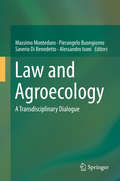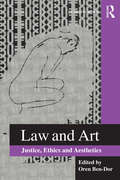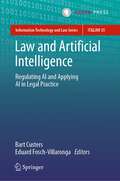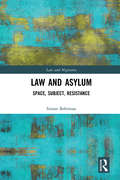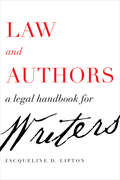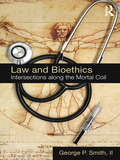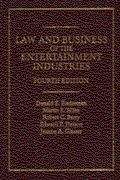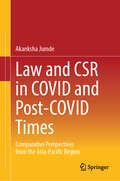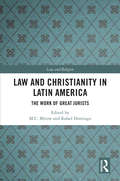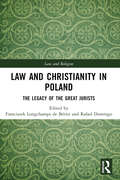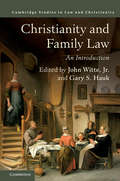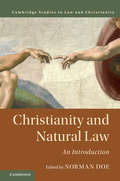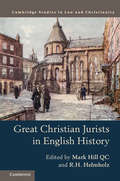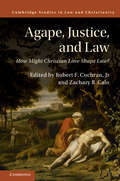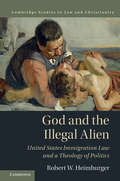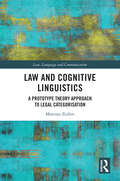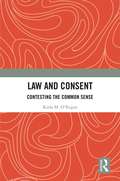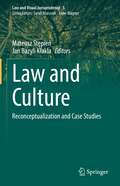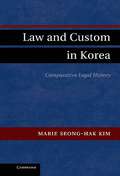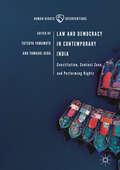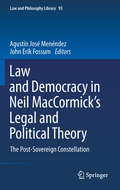- Table View
- List View
Law and Agroecology
by Massimo Monteduro Pierangelo Buongiorno Saverio Benedetto Alessandro IsoniThis book represents a first attempt to investigate the relations between Law and Agroecology. There is a need to adopt a transdisciplinary approach to multifunctional agriculture in order to integrate the agroecological paradigm in legal regulation. This does not require a super-law that hierarchically purports to incorporate and supplant the existing legal fields; rather, it calls for the creation of a trans-law that progressively works to coordinate interlegalities between different legal fields, respecting their autonomy but emphasizing their common historical roots in rus in the process. Rus, the rural phenomenon as a whole, reflects the plurality and interdependence of different complex systems based jointly on the land as a central point of reference. "Rural" is more than "agricultural": if agriculture is understood traditionally as an activity aimed at exploiting the land for the production of material goods for use, consumption and private exchange, rurality marks the reintegration of agriculture into a broader sphere, one that is not only economic, but also social and cultural; not only material, but also ideal, relational, historical, and symbolic; and not only private, but also public. In approaching rus, the natural and social sciences first became specialized, multiplied, and compartmentalized in a plurality of first-order disciplines; later, they began a process of integration into Agroecology as a second-order, multi-perspective and shared research platform. Today, Agroecology is a transdiscipline that integrates other fields of knowledge into the concept of agroecosystems viewed as socio-ecological systems. However, the law seems to still be stuck in the first stage. Following a reductionist approach, law has deconstructed and shattered the universe of rus into countless, disjointed legal elementary particles, multiplying the planes of analysis and, in particular, keeping Agricultural Law and Environmental Law two separate fields.
Law and Art: Justice, Ethics and Aesthetics
by Oren Ben-DorIn engaging with the full range of 'the arts', contributors to this volume consider the relationship between law, justice, the ethical and the aesthetic. Art continually informs the ethics of a legal theory concerned to address how theoretical abstractions and concrete oppressions overlook singularity and spontaneity. Indeed, the exercise of the legal role and the scholarly understanding of legal texts were classically defined as ars iuris - an art of law - which drew on the panoply of humanist disciplines, from philology to fine art. That tradition has fallen by the wayside, particularly in the wake of modernism. But approaching art in that way risks distorting the very inexpressibility to which art is attentive and responsive, whilst remaining a custodian of its mystery. The novelty and ambition of this book, then, is to elicit, in very different ways, styles and orientations, the importance of the relationship between law and art. What can law and art bring to one another, and what can their relationship tell us about how truth relates to power? The insights presented in this collection disturb and supplement conventional accounts of justice; inaugurating new possibilities for addressing the origin of violence in our world.
Law and Artificial Intelligence: Regulating AI and Applying AI in Legal Practice (Information Technology and Law Series #35)
by Bart Custers Eduard Fosch-VillarongaThis book provides an in-depth overview of what is currently happening in the field of Law and Artificial Intelligence (AI). From deep fakes and disinformation to killer robots, surgical robots, and AI lawmaking, the many and varied contributors to this volume discuss how AI could and should be regulated in the areas of public law, including constitutional law, human rights law, criminal law, and tax law, as well as areas of private law, including liability law, competition law, and consumer law. Aimed at an audience without a background in technology, this book covers how AI changes these areas of law as well as legal practice itself. This scholarship should prove of value to academics in several disciplines (e.g., law, ethics, sociology, politics, and public administration) and those who may find themselves confronted with AI in the course of their work, particularly people working within the legal domain (e.g., lawyers, judges, law enforcement officers, public prosecutors, lawmakers, and policy advisors).Bart Custers is Professor of Law and Data Science at eLaw - Center for Law and Digital Technologies at Leiden University in the Netherlands.Eduard Fosch-Villaronga is Assistant Professor at eLaw - Center for Law and Digital Technologies at Leiden University in the Netherlands.
Law and Asylum: Space, Subject, Resistance (Law and Migration)
by Simon BehrmanIn contrast to the claim that refugee law has been a key in guaranteeing a space of protection for refugees, this book argues that law has been instrumental in eliminating spaces of protection, not just from one’s persecutors but also from the grasp of sovereign power. By uncovering certain fundamental aspects of asylum as practised in the past and in present day social movements, namely its concern with defining space rather than people and its role as a space of resistance or otherness to sovereign law, this book demonstrates that asylum has historically been antagonistic to law and vice versa. In contrast, twentieth-century refugee law was constructed precisely to ensure the effective management and control over the movements of forced migrants. To illustrate the complex ways in which these two paradigms – asylum and refugee law – interact with one another, this book examines their historical development and concludes with in-depth studies of the Sanctuary Movement in the United States and the Sans-Papiers of France. The book will appeal to researchers and students of refugee law and refugee studies; legal and political philosophy; ancient, medieval and modern legal history; and sociology of political movements.
Law and Authority in British Legal History, 1200–1900
by Mark GodfreyBy presenting original research into British legal history, this volume emphasises the historical shaping of the law by ideas of authority. The essays offer perspectives upon the way that ideas of authority underpinned the conceptualisation and interpretation of legal sources over time and became embedded in legal institutions. The contributors explore the basis of the authority of particular sources of law, such as legislation or court judgments, and highlight how this was affected by shifting ideas relating to concepts of sovereignty, religion, political legitimacy, the nature of law, equity and judicial interpretation. The analysis also encompasses ideas of authority which influenced the development of courts, remedies and jurisdictions, international aspects of legal authority when questions of foreign law or jurisdiction arose in British courts, the wider authority of systems of legal ideas such as natural law, the authority of legal treatises, and the relationship between history, law and legal thought.
Law and Authors: A Legal Handbook for Writers
by Jacqueline D. LiptonThis accessible, reader-friendly handbook will be an invaluable resource for authors, agents, and editors in navigating the legal landscape of the contemporary publishing industry. Drawing on a wealth of experience in legal scholarship and publishing, Jacqueline D. Lipton provides a useful legal guide for writers whatever their levels of expertise or categories of work (fiction, nonfiction, or academic). Through case studies and hypothetical examples, Law and Authors addresses issues of copyright law, including explanations of fair use and the public domain; trademark and branding concerns for those embarking on a publishing career; laws that impact the ways that authors might use social media and marketing promotions; and privacy and defamation questions that writers may face. Although the book focuses on American law, it highlights key areas where laws in other countries differ from those in the United States. Law and Authors will prepare every writer for the inevitable and the unexpected.
Law and Bioethics: Intersections Along the Mortal Coil
by George P. Smith IIGeorge P. Smith, II is a leading figure in the world of medical law and ethics. During his long career he has addressed some of the most important issues in bioethics and has contributed much original thought to debates in the field. This book celebrates his contribution to scholarship in this area and brings together his key writings in bioethics. The chapters include previously published material which has been substantially updated to reflect recent developments in medicine and law. The book covers topics such as: human rights and medical law; the allocation of resources and distributive justice; ethical relativism; science and religion; and public health emergencies. Taken as a whole, this book examines the extent to which law, medicine, economics, and bioethics interact as synergistic vectors of force in shaping and setting both personal and public responses to the complexities of biotechnology, or what has been referred to as "The New Biology." All too often, past considerations of this topic have neglected to recognise the synergistic influences of law as a catalyst for codifying contemporary values into normative standards. Professor Smith reaches the conclusion that if traditional bioethical principles are to be seen as pertinent constructs for policy making, they must be broadened through the law of public health and Human rights. Law and Bioethics: Intersections along the Mortal Coil casts law as the pivotal force in bringing stability to the ongoing debates on how to maintain bioethical relevance in decision making and in so doing, it offers an excellent overview of the current bioethical issues in medical law considered in light of recent and ongoing technological developments in medicine. This book will be of particular interest to academics and students of Law, Political Science, Philosophy and Economics.
Law and Business of the Entertainment Industries: Fourth Edition
by Donald E. Biederman Martin E. Silfen Robert C. Berry Edward P. Pierson Jeanne A. GlasserThis edition is divided into two parts--one dealing with general principles and the other dealing with specific entertainment and related industries.
Law and CSR in COVID and Post-COVID Times: Comparative Perspectives from the Asia-Pacific Region
by Akanksha JumdeThis book presents a comprehensive examination of the impact of COVID and post-COVID times on Corporate Social Responsibility (CSR) compliance and related legal frameworks in the Asia-Pacific region. The book utilizes various research methodologies to analyze corporates' responses to legislative and regulatory frameworks on CSR during the COVID pandemic. Focusing primarily on countries including China, India, Indonesia, and Australia, the book delves into the contrasting approaches taken by these nations in enforcing and regulating CSR. While some countries adopt hard law measures to ensure socially responsible behaviors, others rely on normative approaches such as the ASX Listing Rules. Through a combination of comparative doctrinal analysis and empirical socio-legal-based research methods, the book assesses the state of CSR compliance in selected countries. By analyzing companies' CSR disclosures and conducting interviews with stakeholders, the study identifies gaps in the existing legal literature. The book fills these gaps by offering practical recommendations to enhance policy development and strengthen the legal frameworks. It emphasizes the importance of corporate culture in influencing CSR-related activities. In conclusion, this book provides valuable insights into how companies can better comply with CSR regulations and improve their societal impact.
Law and Christianity in Latin America: The Work of Great Jurists (Law and Religion)
by M.C. Mirow and Rafael DomingoThis volume examines the lives of more than thirty-five key personalities in Latin American law with a focus on how their Christian faith was a factor in molding the evolution of law in their countries and the region. The book is a significant contribution to our ability to understand the work and perspectives of jurists and their effect on legal development in Latin America. The individuals selected for study exhibit wide-ranging areas of expertise from private law and codification, through national public law and constitutional law, to international developments that left their mark on the region and the world. The chapters discuss the jurists within their historical, intellectual, and political context. The editors selected jurists after extensive consultation with legal historians in various countries of the region looking at the jurist’s particular merits, contributions to law in general, religious perspective, and importance within the specific country and period under consideration. Giving the work a diversity of international and methodological perspectives, the chapters have been written by distinguished legal scholars and historians from Latin America and around the world. The collection will appeal to scholars, lawyers, and students interested in the interplay between law and religion. Political, social, legal, and religious historians among other readers will find, for the first time in English, authoritative treatments of the region’s essential legal thinkers and authors. Students and other who may not read Spanish will appreciate these clear, accessible, and engaging English studies of the region’s great jurists.
Law and Christianity in Poland: The Legacy of the Great Jurists (Law and Religion)
by Rafael Domingo Franciszek Longchamps de BérierThis volume is the first comprehensive study of the Polish history of law and Christianity written in English for a global audience. It examines the lives of twenty-one central figures in Polish law with a focus on how their Christian faith was a factor in molding the evolution of law in their country and the region. The individuals selected for study exhibit wide-ranging areas of expertise, from private law and codification, through national public law and constitutional law, to international developments that left their mark on Poland and the world. The chapters discuss the jurists within their historical, intellectual, and political context. The editors selected jurists after extensive consultation with legal historians looking at the jurists’ particular merits, contributions to law in general, religious perspective, and period under consideration. The collection will appeal to scholars, lawyers, and students interested in the interplay between law and religion. Political, social, legal, and religious historians, among other readers, will find, for the first time in English, authoritative treatments of essential Polish legal thinkers and authors.
Law and Christianity: An Introduction (Law and Christianity)
by Gary S. Witte John Jr. HaukThe Western tradition has always cherished the family as an essential foundation of a just and orderly society, and thus accorded it special legal and religious protection. Christianity embraced this teaching from the start, and many of the basics of Western family law were shaped by the Christian theologies of nature, sacrament, and covenant. This volume introduces readers to the enduring and evolving Christian norms and teachings on betrothals and weddings; marriage and divorce; women's and children's rights; marital property and inheritance; and human sexuality and intimate relationships. The chapters are authoritatively written but accessible to college and graduate students and scholars, as well as clergy and laity. While alert to the hot button issues of sexual liberty today, the contributing authors let the historical figures speak for themselves about what Christianity has and can contribute to the protection and guidance of our most intimate association.
Law and Christianity: An Introduction (Law and Christianity)
by Norman DoeHistorically, natural law has played a pivotal role in Christian approaches to the law, and a contested role in legal philosophy generally. However, comparative study of natural law across global Christian traditions is largely neglected. This book provides not only the history of natural law ideas across mainstream Christian traditions worldwide, but also an ecumenical comparison of the contemporary natural law positions of different traditions. Its focus is not solely theoretical: it tests the practical utility of natural law by exploring its use in the legal systems of the churches studied. Alongside analysis of the assumptions underlying the concept, it also proposes a jurisprudence of Christian law itself. With chapters written by distinguished lawyers and theologians across the world, this book is designed for those studying and teaching law or theology, those who practice and study ecumenism, and those involved in the practice of church law.
Law and Christianity: Great Christian Jurists in English History (Law and Christianity)
by Mark Hill Helmholz R. h.The Great Christian Jurists series comprises a library of national volumes of detailed biographies of leading jurists, judges and practitioners, assessing the impact of their Christian faith on the professional output of the individuals studied. Little has previously been written about the faith of the great judges who framed and developed the English common law over centuries, but this unique volume explores how their beliefs were reflected in their judicial functions. This comparative study, embracing ten centuries of English law, draws some remarkable conclusions as to how Christianity shaped the views of lawyers and judges. Adopting a long historical perspective, this volume also explores the lives of judges whose practice in or conception of law helped to shape the Church, its law or the articulation of its doctrine.
Law and Christianity: How Might Christian Love Shape Law? (Law and Christianity)
by Cochran Robert F. Jr. Calo Zachary R.In a provocative essay, philosopher Jeffrie Murphy asks: 'what would law be like if we organized it around the value of Christian love, and if we thought about and criticized law in terms of that value?'. This book brings together leading scholars from a variety of disciplines to address that question. Scholars have given surprisingly little attention to assessing how the central Christian ethical category of love - agape - might impact the way we understand law. This book aims to fill that gap by investigating the relationship between agape and law in Scripture, theology, and jurisprudence, as well as applying these insights to contemporary debates in criminal law, tort law, elder law, immigration law, corporate law, intellectual property, and international relations. At a time when the discourse between Christian and other world views is more likely to be filled with hate than love, the implications of agape for law are crucial.
Law and Christianity: Pope Benedict XVI’s Legal Thought
by Cartabia, Marta and Simoncini, Andrea Marta Cartabia Andrea SimonciniThroughout Pope Emeritus Benedict XVI's pontificate he spoke to a range of political, civil, academic, and other cultural authorities. These speeches reveal a striking sensitivity to the fundamental problems of law, justice, and democracy. He often presented a call for Christians to address issues of public ethics such as life, death, and family from what they have in common with other fellow citizens: reason. This book discusses the speeches in which the Pope Emeritus reflected most explicitly on this issue, along with commentary from distinguished legal scholars. It responds to Benedict's invitation to engage in public discussion on the limits of positivist reason in the domain of law from his address to the Bundestag. Although the topics of each address vary, they are joined by a series of core ideas whereby Benedict sketches, unpacks, and develops an organic and coherent way to formulate a 'public teaching' on justice and law.
Law and Christianity: United States Immigration Law and a Theology of Politics (Law and Christianity)
by Robert W. HeimburgerToday in the United States, millions of men, women, and children are considered 'illegal aliens' under federal law. While the presence of these migrants runs against the law, many arrive in response to U. S. demand for cheap labor and stay to contribute to community life. This book asks where migrants stand within God's world and how authorities can govern immigration with Christian ethics. The author tracks the emergence of the concept of the illegal alien in federal U. S. law while exploring Christian ways of understanding belonging, government, and relationships with neighbors. This is a thought-provoking book that provides a fresh response to the difficult issue of illegal immigration in the United States through the context of Christian theology.
Law and Cognitive Linguistics: A Prototype Theory Approach to Legal Categorisation (ISSN)
by Mateusz ZeifertThis book advances the prototype theory of categorisation within a legal context. The work adopts a multidisciplinary approach and draws on insights from cognitive psychology, cognitive linguistics, and analytic philosophy to discuss semantic problems present in law. Designed as a bridge between cognitive linguistics and legal theory, it argues that categorisation is a crucial cognitive operation for the application of law and that theories of categorisation are relevant to legal theory. It makes the case that the prototype approach is better suited than more formal approaches usually utilised in jurisprudence to explaining many familiar linguistic problems found in law, such as vagueness, polysemy, the flexibility of meaning, the generality of language, context dependence of meaning, linguistic indeterminacy, and so on. The book focuses on problems of semantic analysis in law, both in concrete cases, that is, particular cases before courts, and, at the theoretical level, on methods of statutory interpretation. It will be a valuable resource for academics and researchers working in the areas of Law and Language, Legal Theory, Legal Philosophy, and Legal Linguistics.
Law and Consent: Contesting the Common Sense
by Karla M. O'ReganConsent is used in many different social and legal contexts with the pervasive understanding that it is, and has always been, about autonomy – but has it? Beginning with an overview of consent’s role in law today, this book investigates the doctrine’s inseparable association with personal autonomy and its effect in producing both idealised and demonised forms of personhood and agency. This prompts a search for alternative understandings of consent. Through an exploration of sexual offences in Antiquity, medical practice in the Middle Ages, and the regulation of bodily harm on the present-day sports field, this book demonstrates that, in contrast to its common sense story of autonomy, consent more often operates as an act of submission than as a form of personal freedom or agency. The book explores the implications of this counter-narrative for the law’s contemporary uses of consent, arguing that the kind of freedom consent is meant to enact might be foreclosed by the very frame in which we think about autonomy itself. This book will be of interest to scholars of many aspects of law, history, and feminism as well as students of criminal law, bioethics, and political theory.
Law and Creativity in the Age of the Entertainment Franchise
by Kathy Bowrey Michael HandlerMuch of the real value in the entertainment industry today lies in franchises – fictional universes, entertainment concepts, reinventions of cultural traditions and celebrity – that create an ongoing presence in the marketplace. The entertainment franchise now shapes the global cultural landscape. However, scholars have devoted little attention to how intellectual property law has changed or is being stretched in practice to accommodate this type of creativity and form of enterprise. Covering law and practice in jurisdictions such as the UK, the EU, the USA, Australia, Spain and the Caribbean, this collection explores the 'fit' of intellectual property laws with specific franchises and tracks the way creators and entrepreneurs work around law's limitations. Case studies include mega-film franchises, fan activity, hip-hop, the management of celebrity reputation, flamenco, 'Disneyfied' theatre, film and television funding, arts festivals and 'carnival in a box'.
Law and Crime (Key Approaches to Criminology)
by Tony Ward Gerry JohnstoneWhat is the definition of ′crime′? Law and Crime helps the criminologist to understand how the law constructs crime and how one might engage in critical analysis of such legal constructions. It uses a thematic approach to comprehensively explore the relationship between criminal conduct, criminal justice and the law. The book introduces key topics in criminal law scholarship for criminologists, including: criminalization fault and criminal responsibility corporate liability the production of criminal guilt the nature of judicial punishment. Aimed at students with no prior knowledge of law, the book includes many useful features to enhance understanding, from chapter overviews and key terms to study questions and suggestions for further reading. The Key Approaches to Criminology series celebrates the removal of traditional barriers between disciplines and, specifically, reflects criminology’s interdisciplinary nature and focus. It brings together some of the leading scholars working at the intersections of criminology and related subjects. Each book in the series helps readers to make intellectual connections between criminology and other discourses, and to understand the importance of studying crime and criminal justice within the context of broader debates. The series is intended to have appeal across the entire range of undergraduate and postgraduate studies and beyond, comprising books which offer introductions to the fields as well as advancing ideas and knowledge in their subject areas.
Law and Culture: Reconceptualization and Case Studies (Law and Visual Jurisprudence #5)
by Mateusz Stępień Jan Bazyli KlaklaDivided into three parts, this book examines the relationship between law and culture from various perspectives, both theoretical and empirical. Part I outlines the framework for further considerations and includes new, innovative conceptualizations of two ideas that are essential to the topic of law and culture: legal culture and customary law. Both of these reappear later in the more empirically oriented chapters of Parts II and III. Part II includes chapters on the relationships between law, customs, and culture, drawing heavily on the tradition and achievements of the anthropology of law and touching on important problems of multiculturalism, legal pluralism, and cultural defense. It focuses on the more intangible meaning of culture, while Part III addresses its more material, tangible aspects and the issue of cultural production, as well as its intersection with law.
Law and Custom in Korea
by Marie Seong-Hak KimThis book sets forth the evolution of Korea's law and legal system from the Chosǒn dynasty through the colonial and postcolonial modern periods. This is the first book in English that comprehensively studies Korean legal history in comparison with European legal history, with particular emphasis on customary law. Korea's passage to Romano-German civil law under Japanese rule marked a drastic departure from its indigenous legal tradition. The transplantation of modern civil law in Korea was facilitated by Japanese colonial jurists who themselves created a Korean customary law; this constructed customary law served as an intermediary regime between tradition and the demands of modern law. The transformation of Korean law by the brisk forces of Westernization points to new interpretations of colonial history and it presents an intriguing case for investigating the spread of law on the global level. In-depth discussions of French customary law and Japanese legal history in this book provide a solid conceptual framework suitable for comparing European and East Asian legal traditions.
Law and Democracy in Contemporary India: Constitution, Contact Zone, and Performing Rights (Human Rights Interventions)
by Tatsuya Yamamoto Tomoaki UedaThis book analyses legal orders, actors and democracy in contemporary India, with a particular focus on the everyday contexts and dynamics of human rights, citizenship and socio-economic rights and laws. The contributions explore both ‘institutionalization from above’, where the judiciary and legislative body aim to govern people, and ‘institutionalization from below’, where the governed attempt to expand their substantive rights embedded within their everyday lives. This analysis identifies contact zones between the two directions, which act as spaces for democratic participation and negotiation. Such a perspective should be useful to both those who are interested in Indian politics, and anthropologists and sociologists working on dynamics of laws and rights.
Law and Democracy in Neil MacCormick's Legal and Political Theory: The Post-Sovereign Constellation
by John Erik Fossum Agustín José MenéndezThis volume offers a collection of articles by leading legal and political theorists. Originally intended as a celebration of MacCormick's work on the occasion of the completion of the four-volume series on Law, State and Practical Reason, it has turned into a homage and salute after MacCormick's passing. Cast in MacCormick's reflexive spirit, the book presents a critical reconstruction of the Scottish philosopher's work, with the aim of revealing the connections between law and democracy in his writings and furthering his insights in each specific field. Neil MacCormick made outstanding contributions to the understanding of law and democracy under conditions of pluralism. His institutional theory of law has elucidated the close connection between the normative character of law as a means of social integration and legal social practices. This has produced a synthesis of the key insights of the legal and political theories of Kelsen, Hart, Alexy and Dworkin, and has broken new ground by undermining the 'monolithic' and 'nation-state' centered character of standard legal theories.
